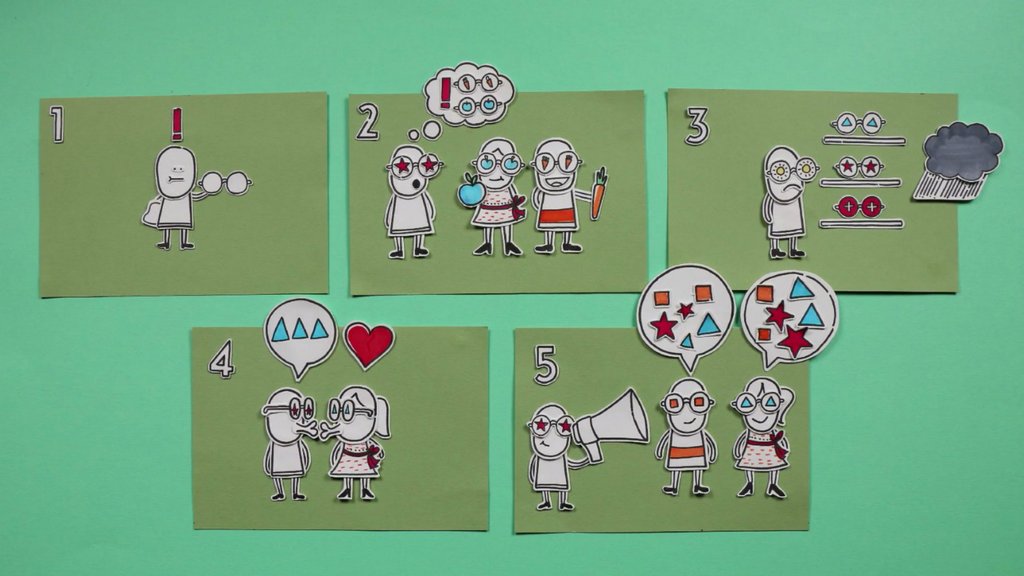Research - 16.08.2016 - 00:00
Multirational competence: Off with the blinders!
What are the characteristics of managers who are capable of orchestrating the diversity of ideas? Multirational competence is the topic of the twelfth film of the "Little Green Bags" animation video series. The text was written by Kuno Schedler, Professor of Public Management at the University of St.Gallen.

17 August 2016. Organisations develop multiple rationalities as a reaction to an increase in complexity of their environment. Within one single organisation there exist different logics simultaneously and in perpetuity, which hampers communication within the organisation and causes latent conflicts.
Far-sighted management with multirational competence
How executives develop this pluralism in a constructive manner is revealed by the twelfth video of the "Little Green Bags" series. It describes pitfalls and three myths which frequently result in blinkered thinking in organisations:
- Efficiency on its own is not enough. Broadly based legitimation is often more important.
- Expertise on its own does not bring success. Only when knowledge is interlinked will innovations emerge.
- Good management is not the same as following a dominant business logic.
The upshot: organisations need a number of rationalities to live up to their complex surroundings, to anticipate problems and to keep innovating. Far-sighted managers listen, ask, let differences be differences and encourage others to adopt this mind set, too. They know that organisations need many eyes and ears in order to understand their surroundings. They translate between rationalities, they set examples when it comes to holding different opinions and beliefs. They demonstrate multirational competence.
Bite-sized knowledge
The HSG video series Little Green Bags provides an opportunity to find out more about the fields of research at the University of St.Gallen. Themes including the "inter-generational contract", digital living, the renewal energy transition, corporate social responsibility, innovation and the public welfare provide material for discussing issues relevant in and to society, business and politics, and are thus a key part of research and teaching at the HSG. The Little Green Bags video series (the title is derived from "brown bag lunch" academic seminars) is designed to provide knowledge in bite-sized format.
It all started with the film What is CSR? on corporate social responsibility made by the Institute for Business Ethics. Then the Institute for Technology Management brought out video pieces on Effectuation and The Ten Myths of Entrepreneurship. A fourth short movie was devoted to exploring how innovation occurs, while the fifth, entitled Digital Good Life, featured Miriam Meckel explaining how to live in both the digital and analogue worlds while avoiding techno stress. A sixth film was released on how Real Marketing can be utilised to close the sale, then in a seventh release, Elgar Fleisch and Markus Weinberger presented the Internet of Things and its uses. Public value was the topic of the eighth instalment in the HSG series which explored what the "public welfare" actually consists of and relevant measurement approaches, narrated by HSG lecturer Timo Meynhardt. HSG Professor Martin Eling brought out the ninth film on the "inter-generational contract" for ensuring equity of sacrifices and benefits between older and younger workers. HSG leadership expert Heike Bruch’s video is about organisational energy. Thomas Dyllick’s video shows the nature of real entrepreneurial sustainability and how companies are able to solve societal problems by means of careful economic activities.
Animated video series Little Green Bags
The films were produced in cooperation with Zurich animation studio Zense and film director and St.Gallen University graduate Andri Hinnen (SIM-HSG). The scientific director behind the animated film series is Prof Thomas Beschorner, Director of the HSG Institute for Business Ethics. In June 2015 the film Public Value: Value Creation, Public Welfare and the Individual received a silver award at the French film festival Deauville Green Awards 2015. The Swiss National Science Foundation has likewise recognised the merits of this approach to science communication, providing support for further films in the series via the SNF Agora Instrument.
photo: sequence from the animated film / Zense - Reframing Complexity
More articles from the same category
Discover our special topics











